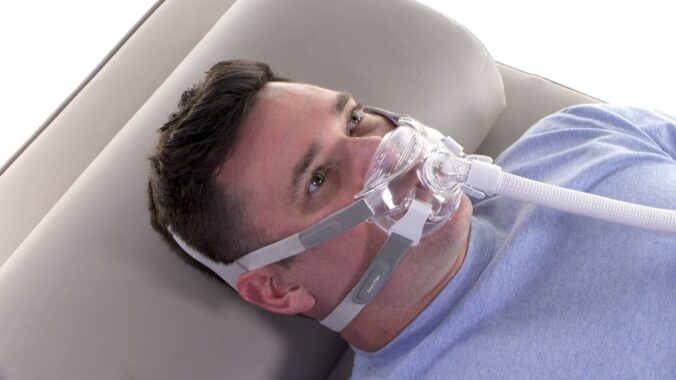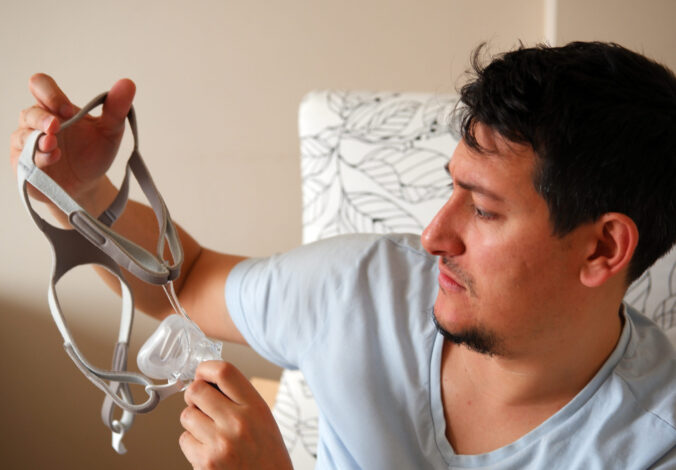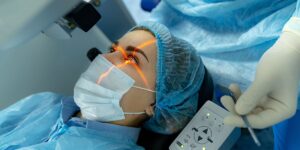When a person has frequent breathing pauses while they are sleeping, it is known as sleep apnea. If this happens, your body will jolt you awake so it can get you to breathe again. You can’t get a good night’s sleep due to all the interruptions, so you wake up feeling more exhausted than normal.
However, the repercussions of sleep apnea go well beyond merely making you feel sleepy. If left untreated, it may raise a person’s risk of diabetes, heart disease, and other long-term health problems.
You will have sleep apnea if your airway becomes blocked or collapses while you are sleeping. You could snort sharply when you start breathing again, startling both you and anybody else with whom you share a bed.
Obesity and high blood pressure are only two of the medical conditions that sleep apnea has been linked to. These conditions, when coupled with sleep deprivation, may have negative effects on a range of biological processes and systems.

Machines for inhaling air
Sleep apnea may exacerbate the symptoms of asthma and chronic obstructive pulmonary disease (COPD) because it deprives your body of oxygen while you sleep (COPD). You may realize that it is more challenging to do the exercise or that it is tougher to catch your breath if you exercise more often than usual.
Hormonal symptoms
Cells that are afflicted with insulin resistance do not respond to the hormone insulin as well. Insulin resistance is more likely to develop in those with sleep apnea. Your blood sugar level will rise if your cells can’t absorb insulin as well as they should, which increases your risk of type 2 diabetes.
Sleep apnea has been associated with metabolic syndrome, a collection of risk factors for heart disease. High blood pressure, excessive LDL cholesterol, high blood sugar, and an enlarged waist circumference are some of these risk factors. One of the risk factors for metabolic syndrome is sleep apnea.
Intestinal symptoms
You have a greater chance of getting fatty liver disease, liver scarring, and significantly elevated liver enzyme levels if you have sleep apnea.
Obstructive sleep apnea may make it harder to get asleep and remain asleep while aggravating heartburn and other gastroesophageal reflux disease (GERD) symptoms.
The circulatory and cardiovascular systems, respectively
Other risk factors for sleep apnea include obesity and high blood pressure, both of which place extra strain on your heart. If you have apnea, you are more likely to have an abnormal heartbeat, such as atrial fibrillation, which might increase your risk of having a stroke. Heart failure is more likely to happen to those who suffer sleep apnea.
Neural system
One of the varieties of sleep apnea is known as central sleep apnea, and it is defined by a disruption in the signals that the brain sends to and receives from the respiratory center. Neurological symptoms including tingling and numbness have also been related to this specific kind of sleep apnea.

Low sex drive
If you have sleep apnea, you could have less of a sexual drive. If the pair is male, it might harm their ability to have children and cause erectile dysfunction in men.
Several different symptoms
Along with morning dry mouth or scratchy throat, headache, trouble concentrating, irritability, and daytime problems paying attention, sleep apnea is also often characterized by these additional symptoms.
Cardiovascular risk, metabolism, and sleep apnea
A lot of studies, according to Jun, have shown a link between sleep apnea and conditions including type 2 diabetes, strokes, and heart attacks, as well as a shortened lifespan. Why is this situation related? One explanation for this is because people with sleep apnea often have obesity, and, in his opinion, being fat greatly increases the risk of diabetes, stroke, and heart attack. In the great majority of cases, obesity is the main cause of both ailments, according to Jun’s explanation.
But it’s important to remember that not all persons with sleep apnea are obese. Additionally, statistics show a separate connection between sleep apnea and diabetes. In Jun’s opinion, “In spite of weight, research from our group and others has shown that sleep apnea raises the chance of developing diabetes. Also increasing blood sugar levels is sleep apnea.”
One of the most crucial things overweight or obese people can do to treat or prevent sleep apnea is to lose weight. A person is more likely to develop sleep apnea if they tend to retain fat in vulnerable places like the neck, mouth, and upper belly. This weight contributes to airway collapse when a person is sleeping because it narrows the neck and puts pressure on the lungs.
Women in particular should take care as they age. This changes with time since premenopausal women tend to gain weight in their hips and lower bodies as they approach menopause as opposed to their stomachs. The steady buildup of fat in areas of the body that are generally associated with males, such the stomach, is linked to an increased risk of sleep apnea.
When a woman hits menopause, her hormones start to change, and as a consequence, she could start to gain weight more like a man. The moment has come to pay attention to the risks of sleep apnea, says Jun, since after menopause women begin to catch up to men in the rates of apnea. “Now is the moment to be aware of the risks associated with sleep apnea.”
By correctly identifying and treating sleep apnea, you may improve your health.
Sleep apnea must be addressed since, if left untreated, it may have significant negative implications on a person’s health. Even while sleep apnea has been linked to several high-profile deaths, such as that of Judge Antonin Scalia, Jun contends that the real risk comes from harm done over time. This is due to the long-term impact that sleep apnea does to the body.
The degree of obstructive sleep apnea may range from mild to severe, as determined by the apnea-hypopnea index, a measurement tool (AHI). The AHI takes into consideration the number of times you stop breathing throughout the course of an hour of sleep.
Symptoms that Could Affect Your Work
Numerous symptoms of sleep apnea may have a severe impact on your professional life. Poor sleep hygiene is associated with a variety of problems with job performance, claims Harvard Business Review. Lack of sleep may have a detrimental effect on productivity at work, career advancement, and job happiness.
If you’ve ever suffered daytime drowsiness, you’ve definitely had personal knowledge of how sleep impacts your productivity. When you’re fatigued, it’s challenging to concentrate and complete job. Patients with sleep apnea may commonly feel significant daytime drowsiness, which results in subpar job performance overall.
The loss of sleep caused by sleep apnea may impair cognitive. When asked why they can’t focus, many persons with sleep apnea say that they have fuzzy thinking or can’t think properly. Sleep apnea-related brain fog may reduce productivity, efficiency, and accuracy at work. Additionally, it may have a detrimental impact on creativity, which is crucial in many professions.
For our bodies and minds to recover and be refreshed, we need to sleep. It might be challenging to learn new things, to think properly, and to control our emotions when we don’t get enough sleep. Another typical sign of sleep apnea is mood swings. The capacity to work efficiently and advance in your profession may all be impacted by irritability, despair, and anxiety.
Additionally, your immune system needs sleep. The immune system might potentially deteriorate due to sleep apnea. This may be one element in the explanation for the association between inadequate sleep and higher absenteeism rates at work. As a result, there are a number of sleep apnea symptoms that, if addressed, might hinder your career.

People with sleep apnea are more likely to experience an unexpected job loss.
One of the saddest experiences for many individuals may be being fired or laid off from a job. It may not only leave you jobless but may also harm your chances of finding employment in the future. However, those who suffer untreated sleep apnea may be more likely to lose their jobs or be dismissed.
A 2019 research that was published in the academic journal Sleep examined the relationship between OSA and job loss. In their analysis of 261 individuals, the researchers discovered that 45% of them had a history of numerous job losses due to termination or layoffs. In comparison to individuals without the sleep problem, those with sleep apnea were twice as likely to have had several involuntary job losses.
However, adopting CPAP therapy may help lower these risks since sleep apnea treatment may decrease symptoms and enhance sleep quality. Poor job performance often leads to terminations and layoffs, which may be related to the many sleep apnea symptoms. People may benefit from treatment to prevent these problems, which often result in job loss.
CPAP Therapy for the Treatment of Sleep Apnea
Reducing or removing the apnea episodes you have while sleeping is the aim of sleep apnea therapy. Due to how many patients respond well to CPAP therapy, it has swiftly established itself as the gold standard in medical care.
The air pressure within your airways is raised by CPAP treatment. This helps stop your airways from closing down and causing apnea episodes. As a consequence, most sleep apnea patients have fewer nighttime awakenings and experience deeper, higher-quality sleep. The majority of people also observe positive changes in the signs and dangers of sleep apnea to their health.
If you suffer sleep apnea, one of our doctors may advise you to use CPAP treatment. We collaborate with you to identify treatment options that complement your way of life. Our staff can assist you in locating cozy, practical sleep apnea solutions so you can have a good night’s rest. To help you feel your best and improve your therapy, we also provide continual monitoring. Take our sleep apnea risk assessment as a quick and simple screening tool if you suspect that you may have the condition.
Takeaway
Sleep apnea may be treated in a number of ways. If left untreated, it may prevent you from getting a full night’s rest and raise your chance of developing a number of harmful conditions. Treatments like continuous positive airway pressure (CPAP) and oral appliances may help maintain a sufficient flow of oxygen in your lungs while you are sleeping. If you are overweight, dropping weight may lessen your risk of heart disease while also assisting in the improvement of your sleep apnea symptoms.

















